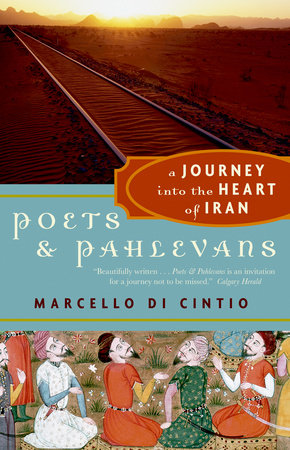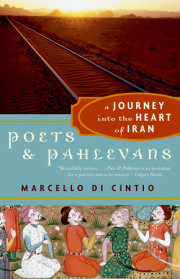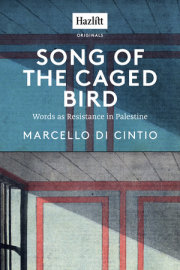1
INTO IRANAnd now they meet — now rise, and now descend,
And strong and fierce their sinewy arms extend;
Wrestling with all their strength they grasp and strain,
And blood and sweat flow copious on the plain;
Like raging elephants they furious close;
Commutual wounds are given and wrenching blows.
Sohrab now claps his hands, and forward springs
Impatiently, and round the Champion clings;
Seizes his girdle belt, with power to tear
The very earth asunder . . .
An old man recites poetry into a microphone. The measured verses float over the assembled crowd through a static-garbled loudspeaker. When the poem ends he calls two wrestlers to the centre of the circle. Both are barefoot, and both brush the ground with their fingertips before touching their lips and forehead. This is an invocation to Allah, something I don’t quite understand. Village men sit on the perimeter in their white turbans and old fedoras, smoke cigarettes and spit out black sunflower seeds. They shout and cheer their muscled heroes.
The wrestlers shake hands and kiss each other on both cheeks, then lock their arms around each other in a warriors’ embrace. Their bodies, now merged, are tense and already sweating. I can see their faces: both are nervous but resolute. Their stillness is momentary. When a referee taps them on their shoulders the men clash.
The poetry, epic tales of ancient wars and legendary heroes, was meant to inspire the wrestlers in their battle, but now the crowd’s roar replaces the old verses in their scarred ears. They push each other back and forth in the circle, maintaining their grip around each other’s waist. Their knuckles blanch. The dust mingles with their sweat and slicks their legs with salty mud. The mob wave their arms and holler instructions in the village dialect. Young boys bounce on their grandfathers’ laps.
Then one wrestler thrusts his body forward. His grip turns to stone and he lifts his opponent from his feet. The noise of the crowd swells. The man hurls his rival to the ground and crashes down on top of him. They are invisible in the cloud of dust until the referee helps them stand. Both are filthy and exhausted, but only one man is a winner. The referee raises his arm and the two wrestlers shake hands and kiss again. The victor strides into the throng of his fans and is immersed in their cheers. The loser leaves alone.
When I pressed the button at the Iranian consulate in Istanbul I had no reason to be confident. I wasn’t granted a visa from the embassy in Ottawa and the verdict on my visa in Istanbul had already been delayed twice. I did not know why. Admitting I was a writer was, in retrospect, a strategic error; Iran is famously wary of foreign “journalists.” Also, Toronto was in the middle of its sars crisis. Canadians were being turned away at borders around the world. The man at the embassy who accepted my visa application wasn’t overly diligent on this point. “Do you have sars?” he asked. I said no and that was that. I worried, though, that his superiors might be less cavalier.
I waited for nearly two weeks, wandering through the fabulous mosques that crown each of Istanbul’s hills and point the way to heaven with their slender minarets. Five times a day the call to prayer boomed out over the city and gave a moment’s respite from the Turkish pop music blaring from every storefront and taxicab. Fashionable Istanbulus smoked water pipes and drank tea in popular garden cafés. The bazaars were filled with briny olives, Turkish silks, Ottoman antiques and cheesy belly-dance costumes. It had been three years since my last visit to the Middle East and it was a pleasure to be back among the pistachio vendors, tea houses and honey-soaked pastries.
But for all Istanbul’s charms, my mind was a thousand kilometres east. I’d spent the last two years infatuated with Iran. I had read Persian history and become obsessed with Iran’s politics, but it was the Persian love for poetry that first drew me to the place. I learned that all Iranians, even small children, could recite poetry from memory. Poets who have been dead for centuries are revered. Their verses resonate over time and colour everyday language. I wanted to investigate this devotion and be in a place where bazaaris and taxi drivers spoke in measured verse. Istanbul was a poor consolation. I wanted to be in Iran.
While the consulate deliberated on my visa application, I bought my ticket for the Trans-Asya Express to Tehran, and did all the things I knew I would not be able to do once I crossed the border. I watched American action films in modern cinemas. I went to European-styled coffee shops to sip espresso, and drank pints of Efes lager in noisy bars. I read a copy of Salman Rushdie’s
Fury I found in a used bookstore.
I returned to the consulate. When the visa official opened the door he was not smiling. Neither was I. “Mr. Marcello?” he asked. I nodded. Then he tapped my passport against my chest and opened it to a fresh visa sticker. “You have one month. Have good times in Iran.”
The Haydarapasa train station stands on the banks of the Bosphorus Strait on the very edge of the continent. Asia begins here, and from Haydarapasa there is only east. I went to the station early, and was the first passenger on the train. The car was dark, but enough light filtered in through the window for me to find my cabin and stow my rucksack beneath a seat.
Another man entered the cabin. He was in his fifties, balding and with a thick white moustache. He smiled and greeted me, but beyond his
salaam I didn’t know what he said.
“I’m sorry, but I don’t understand.”
“You are a foreigner,” he said in English. I was relieved. “Tourist?”
“Yes,” I said, though I hate that designation.
Copyright © 2006 by Marcello Di Cintio. All rights reserved. No part of this excerpt may be reproduced or reprinted without permission in writing from the publisher.




